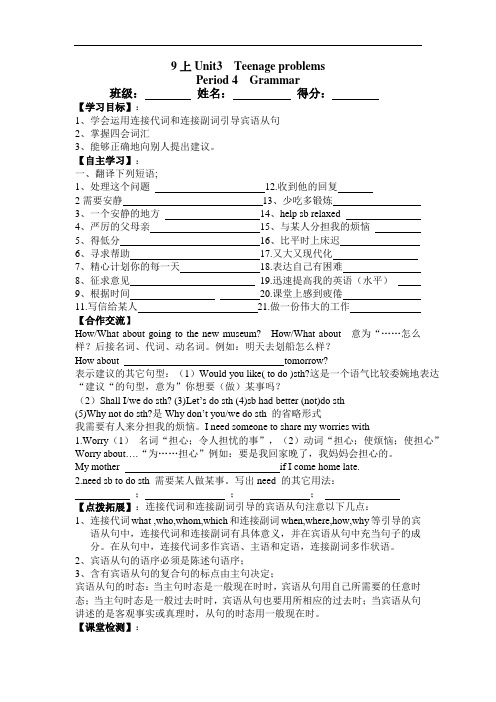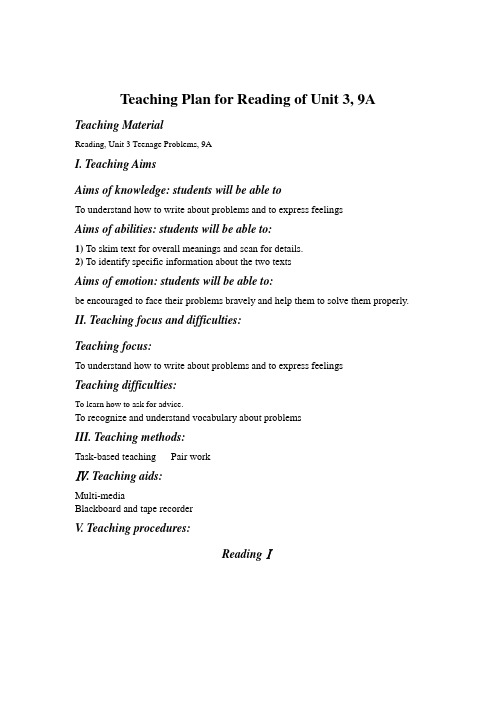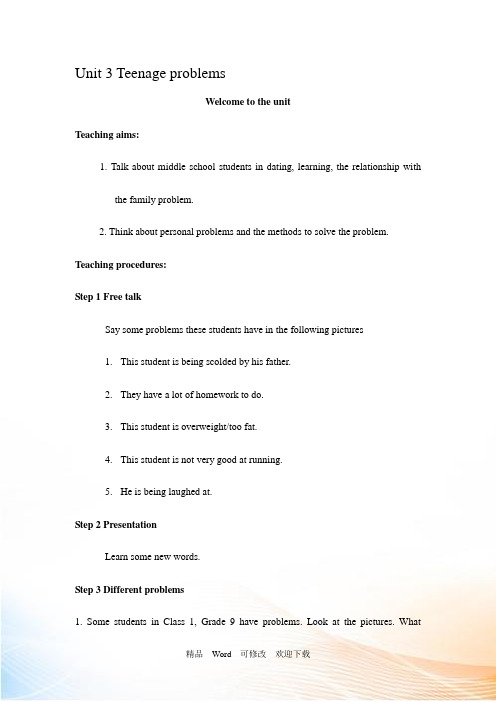牛津译林版九年级上册英语(新)学案:Unit3 Teenage problems Reading 1
- 格式:doc
- 大小:44.02 KB
- 文档页数:4

牛津译林版英语九年级上册 Unit 3 《Teenage problems.》教学设计5一. 教材分析牛津译林版英语九年级上册Unit 3《Teenage problems》主要讨论了青少年时期可能遇到的各种问题,如学习压力、与父母沟通、朋友间的矛盾等。
本节课旨在通过讨论这些问题,让学生了解青少年时期的困惑和挑战,提高他们解决问题的能力。
本课的核心词汇和句型为学生提供了表达自己观点和倾听他人意见的语言工具。
二. 学情分析九年级的学生正处于青少年时期,他们面临着各种挑战和压力。
他们在学习、生活、人际交往等方面都有自己独特的困惑。
通过对学生的观察和了解,我发现他们在英语听说读写方面有较好的基础,但部分学生在表达自己观点时仍存在一定的困难。
因此,在教学过程中,我需要关注这部分学生的需求,帮助他们更好地表达自己。
三. 教学目标1.知识目标:学生能够掌握本节课的核心词汇和句型,正确运用它们表达自己的观点和倾听他人意见。
2.能力目标:学生能够在课堂上进行流畅的英语口语交流,提高他们的口语表达能力。
3.情感目标:学生能够理解青少年时期的困惑和挑战,学会关心他人,提高人际沟通能力。
四. 教学重难点1.重点:学生能够熟练运用本节课的核心词汇和句型进行英语口语交流。
2.难点:学生能够正确表达自己的观点,并在交流中倾听他人意见。
五. 教学方法1.任务型教学法:通过设计各种任务,让学生在实践中运用英语,提高他们的口语表达能力。
2.合作学习:鼓励学生之间进行小组讨论,培养他们的团队协作能力。
3.情感教学:关注学生的情感需求,营造一个轻松、愉快的学习氛围。
六. 教学准备1.教学材料:教材、多媒体课件、录音机、磁带。
2.教学工具:黑板、粉笔、挂图。
七. 教学过程1.导入(5分钟)利用多媒体展示一些青少年时期常见的问题,如学习压力、与父母沟通等。
引导学生谈论这些问题,激发他们的兴趣。
2.呈现(10分钟)呈现本节课的核心词汇和句型,让学生通过听力练习和小组讨论来熟悉这些词汇和句型。

9上Unit3 Teenage problemsPeriod 4 Grammar班级:姓名:得分:【学习目标】:1、学会运用连接代词和连接副词引导宾语从句2、掌握四会词汇3、能够正确地向别人提出建议。
【自主学习】:一、翻译下列短语;1、处理这个问题12.收到他的回复2需要安静13、少吃多锻炼3、一个安静的地方14、help sb relaxed4、严厉的父母亲15、与某人分担我的烦恼5、得低分16、比平时上床迟6、寻求帮助17.又大又现代化7、精心计划你的每一天18.表达自己有困难8、征求意见19.迅速提高我的英语(水平)9、根据时间20.课堂上感到疲倦11.写信给某人21.做一份伟大的工作【合作交流】How/What about going to the new museum? How/What about 意为“……怎么样?后接名词、代词、动名词。
例如:明天去划船怎么样?How about tomorrow?表示建议的其它句型:(1)Would you like( to do )sth?这是一个语气比较委婉地表达“建议“的句型,意为”你想要(做)某事吗?(2)Shall I/we do sth? (3)Let’s do sth (4)sb had better (not)do sth(5)Why not do sth?是Why don’t you/we do sth 的省略形式我需要有人来分担我的烦恼。
I need someone to share my worries with1.Worry(1)名词“担心;令人担忧的事”,(2)动词“担心;使烦恼;使担心”Worry about….“为……担心”例如:要是我回家晚了,我妈妈会担心的。
My mother if I come home late.2.need sb to do sth 需要某人做某事。
写出need 的其它用法:;;;【点拨拓展】:连接代词和连接副词引导的宾语从句注意以下几点:1、连接代词what ,who,whom,which和连接副词when,where,how,why等引导的宾语从句中,连接代词和连接副词有具体意义,并在宾语从句中充当句子的成分。

Teaching Plan for Reading of Unit 3, 9A Teaching MaterialReading, Unit 3 Teenage Problems, 9AI. Teaching AimsAims of knowledge: students will be able toTo understand how to write about problems and to express feelingsAims of abilities: students will be able to:1) To skim text for overall meanings and scan for details.2) To identify specific information about the two textsAims of emotion: students will be able to:be encouraged to face their problems bravely and help them to solve them properly. II. Teaching focus and difficulties:Teaching focus:To understand how to write about problems and to express feelingsTeaching difficulties:To learn how to ask for advice.To recognize and understand vocabulary about problemsIII. Teaching methods:Task-based teaching Pair workⅣ. Teaching aids:Multi-mediaBlackboard and tape recorderV. Teaching procedures:ReadingⅠVII. Homework1.Read the text for some times.2.Learn the new words and phrases by heart.3.Finish exercises on P46-47.VIII. Blackboard designUnit 3 Teenage problemsWhat should I do?youth workerⅨ. A summary after teaching:_____________________________________________________________________ _____________________________________________________________________ _____________________________________________________________________ _________________________________________ReadingⅡVII. Blackboard designUnit 3 Teenage problemsWhat should I do?role playⅧ. A summary after teaching:_____________________________________________________________________ _____________________________________________________________________ _____________________________________________________________________ _________________________________________Additional exercises一、根据中英文提示填写单词。

牛津译林版九年级上册Unit 3《Teenage problems》(Study skills)教学设计一. 教材分析牛津译林版九年级上册Unit 3《Teenage problems》(Study skills)围绕着青少年的学习方法展开,旨在让学生通过阅读、听力、口语和写作等环节,了解并掌握各种学习方法,以及如何有效地解决学习中遇到的问题。
本节课的主要内容包括:不同学生有不同的学习风格和策略,如何选择适合自己的学习方法,以及如何养成良好的学习习惯等。
二. 学情分析九年级的学生已经具备了一定的英语基础,能够进行简单的听、说、读、写操作。
但部分学生在面对较复杂的文章时,可能会存在阅读困难,理解能力有限。
此外,学生对学习方法和策略的认识相对较弱,需要老师在教学中进行引导和启发。
三. 教学目标1.知识目标:让学生掌握与学习方法相关的词汇和表达,如effective,strategy, improve等。
2.能力目标:培养学生通过阅读、听力、口语和写作等多种方式,理解和运用本节课所学内容。
3.情感目标:引导学生认识到学习方法的重要性,激发学生探索适合自己的学习方法,养成良好的学习习惯。
四. 教学重难点1.重点:让学生理解和运用本节课所学词汇和表达。
2.难点:引导学生如何选择适合自己的学习方法,以及如何养成良好的学习习惯。
五. 教学方法1.任务型教学法:通过设定各种任务,让学生在实践中学习和运用英语。
2.合作学习法:鼓励学生分组讨论,培养学生的团队协作能力。
3.情感教学法:关注学生的情感需求,激发学生的学习兴趣。
六. 教学准备1.教材:牛津译林版九年级上册Unit 3《Teenage problems》(Studyskills)2.多媒体设备:电脑、投影仪、音响等3.教学素材:相关学习方法的文章、视频等4.课件:制作与本节课相关的内容,包括词汇、图片、视频等七. 教学过程1.导入(5分钟)利用课件展示一些关于学习方法的名言,如“活到老,学到老”、“适合自己的才是最好的”等,引导学生思考如何选择适合自己的学习方法。

牛津译林版九年级上册Unit 3《Teenage problems》(reading 2)教学设计一. 教材分析《牛津译林版九年级上册Unit 3 Teenage problems(reading 2)》讲述了关于青少年面临的问题,通过阅读文章让学生了解并学会应对这些问题。
文章内容丰富,涉及到青少年在生活、学习、心理等方面的困扰。
本节课的主要目的是让学生通过阅读,了解青少年问题,并提高他们的阅读理解能力。
二. 学情分析九年级的学生已经具备一定的英语基础,能够进行简单的阅读和交流。
但他们在阅读理解方面,尤其是通过文章了解和分析问题方面还存在一定的困难。
因此,在教学过程中,需要关注学生的个体差异,引导他们更好地理解文章内容,提高阅读理解能力。
三. 教学目标1.让学生掌握文章主要内容,了解青少年面临的问题及解决方法。
2.提高学生的阅读理解能力,能够通过阅读获取有用信息。
3.培养学生的批判性思维,学会从不同角度分析问题。
4.提升学生的英语听说能力,能够用英语讨论青少年问题。
四. 教学重难点1.重点:掌握文章主要内容,提高阅读理解能力。
2.难点:分析文章中的观点,运用批判性思维讨论青少年问题。
五. 教学方法1.任务型教学法:通过完成各种任务,让学生在实践中学习英语。
2.交际型教学法:鼓励学生积极参与讨论,提高口头表达能力。
3.情境教学法:创设情境,让学生在真实环境中感受和运用英语。
六. 教学准备1.教材:《牛津译林版九年级上册》2.多媒体设备:电脑、投影仪、音响等3.教学素材:相关青少年问题的图片、视频等4.教学卡片:单词、短语等七. 教学过程1.导入(5分钟)利用图片和视频展示青少年面临的问题,引导学生思考并讨论这些问题。
同时,引入本节课的主题:Teenage problems。
2.呈现(10分钟)老师快速阅读文章,引导学生关注文章标题、作者、关键词等。
然后,让学生自主阅读文章,理解文章大意。
3.操练(15分钟)学生分小组,讨论文章中的观点,并从不同角度分析问题。

Unit 3 Teenage problemsWelcome to the unitTeaching aims:1. Talk about middle school students in dating, learning, the relationship withthe family problem.2. Think about personal problems and the methods to solve the problem. Teaching procedures:Step 1 Free talkSay some problems these students have in the following pictures1.This student is being scolded by his father.2.They have a lot of homework to do.3.This student is overweight/too fat.4.This student is not very good at running.5.He is being laughed at.Step 2 PresentationLearn some new words.Step 3 Different problems1. Some students in Class 1, Grade 9 have problems. Look at the pictures. Whatproblems do they have? Complete the sentences with the words in the box. friends, homework, marks, noise, parents, sleepKeys: I don’t get enough sleep. I feel tired in class.I don’t have enough time to do my homework.The TV is always on at my home. The noise almost drives me mad.I don’t have any close friends. Sometimes I feel lonely.Sometimes I get low marks in exams. I feel sad.My parents work all day. They don’t have time for me.2. Millie is talking with her mum about teenage problems. Work in pairs and talk about your problems. Use the conversation below as a model.Millie: Mum, many of my classmates have problems.Mum: Really? How about you? Do you have any problems?Millie: Yes, I do. Sometimes I feel sleepy in class.Mum: Oh dear. You don’t get enough sleep.Millie: What should I do then?Mum: Perhaps you should manage your time better and go to bed earlier.Millie: OK. I’ll try.Step 4 Watch a video about Hobo and Eddie.Read and answer the questions.1. What problem does Eddie have?2. What is unhealthy for Eddie?3. What is Hobo’s suggestion?4. Why does Hobo tell Eddie not to eat too much?Step 5 language points1.You eat too much.too much 太多,修饰不可数名词too many 太多,修饰可数名词much too 太……,修饰形容词e.g. Don’t eat ________ ice cream.There are ________ books on the desk.Lily is ________ fat.2. The TV is always on at my home.我家的电视总是开着。
Unit3 Teenage problemsReading 2Teaching goals:1.知识目标:学习词汇:deal, choice, but, awake, hardly, imagine, doubt, worth, su ggestion, cause, strict, schoolwork, valuable, friendship, list,学习词组:deal with, stay up late, stay awake, have spare time for my hobbies, be worth doing sth, dream of a long holiday, offer me some suggestions,become the cause of my probl em, worry about the time, get into trouble,play outside, be strict with sb, develop our hobbies, stay out,valuable advice, make a list of, work out, according to学习句子:I do not know how I should deal with it.I have no choice but to do it.I cannot imagine my life without hobbies.I often doubt whether it is worth spending so much time on homework.I hope to hear from you soon.I am crazy about football.I do not understand why they are so strict with me.I wonder how I can achieve a balance between my schoolwork and my hobbies.Then work out how much time you need to finish it all.What about choosing your hobby according to the time you time?I hope you think my advice is worth taking.2. 技能目标:1) 通过图片、标题和上下文猜测课文大意;2) 谈论中学生在学习、交友与家人的关系等方面所遇到的问题。
牛津译林版九年级英语上册初三英语9A 省学案初三英语备课组Unit 3 Teenage problemsPeriod 1 Comic strip and Welcome to the unit 备课人:顾文红一、目标导学1、帮助学生学会谈论青少年在学习,交友,家庭关系等方面所遇到的问题。
2、帮助学生学会思考个人问题及解决方法。
3、掌握本课时出现的重要语言点。
二、自学助思1、自学P6-7页生词,掌握单词(短语)的正确读音,了解词义及单词词性。
四会单词:mark______________ mad______________exam______________ perhaps ___________________四会短语:get fat _________________ get enough sleep ________________drive me mad ________________ close friends ____________________get low marks in exam___________ manage your time better __________四会句型:Why not eat less and exercise more?They don’t have time for me.2、大声朗读P34-35页内容,找出下列重点句型并试着翻译成中文。
(1)I’m getting fat.(2)Why not eat less and exercise more?(3)I don’t have enough time to do my homework.(4)Perhaps you should manage your time better and go to bed earlier.三、群学导引1.Free talk : T-Ss :Talk about their problems.2.Pair work: T asks Ss to work in pairs. Describe their good friend’s problems.3. P7 Part A : S /Ss : The students should finish it individually ; Read it aloud and check the answers.4.P 7 Part B : (1) T-ss: T asks the Ss to listen to the tape and try to answer some Qs.(2) Ss: Listen to the tape and read it loudly.(3) Free talk: Ss: work in pairs or groups: make their own dialogues.(4) Ss Share their performance.ic strip: (1) T-ss : Play the tape , the Ss should listen carefully and try to find out the answer to the questions: 1.Why is Eddie getting fat?2. What is Hobo’s suggestion?3. Why does Hobo tell Eddie not to eat too much?(2) Ask the students to act it out,help them if necessary.课堂达标检测一、翻译下列短语。
9上Unit3 Teenage problemsPeriod 2 Reading1【学习目标】:1、学会表达自己的烦恼和情感,学会向别人寻求2、学习并掌握“四会”词汇:deal choice awake hardly image doubt worth suggestioncause strict schoolwork valuable friendship list 及其相关短语3、思考个人问题及其解决问题的方法【自主学习】:一、翻译下列短语;1、出来,对付9.别无选择只得做2、熬夜,迟睡10、保持清醒3、值得做某事11、梦想,4、收到某人来信12、提供一些建议给我5、痴迷于……13、我问题的原因6、担心……14、惹上麻烦7、允许某人做某事15、对某人要求严格8、发展我们的爱好16使我们的生活更有趣17.呆在外面很晚18.取得……和……之间的平衡19.期盼(做)某事20.宝贵建议二、预习P34对话,回答下列问题:1. What problem does Millie have?2. What does she doubt?3. What does she dream of ?4. Why does Hobo tell Eddie not to eat too much?三、翻译下列句子:1、我有一个问题,而且我不知道怎样处理它I have a problem, and I don’t know it2、每天都有许多家庭作业,我别无选择,只能做它。
I have much homework every day, and I it.3、我几乎没有空闲时间顾及我的业余爱好。
I have any my hobbies .4、我经常怀疑花这么多时间做家庭作业是否值得。
I often it is so much time homework5、我希望不久能收到你的来信。
I soon. 【合作交流】:how 与deal with ;what 与do with 搭配使用。
如:He didn’t know how to deal with it.= He didn’t know it.【点拨拓展】:①I have a lot of homework every day, and I have no choice but to do it.每天都有许多家庭作业,我别无选择,只能做它。
have no choice but to do sth 别无选择,只能做某事,还可以说:(1) can do nothing but do sth.(2) can not choose but to do sthI often doubt whether it is worth spending so much time on homework.②我经常怀疑花这么多时间做家庭作业是否值得。
doubt可作动词或名词,意为“怀疑”如:我怀疑他是否能准时到达这里。
I doubt注;doubt具体用法见课本P126Unit3.第三句话。
【课堂检测】:一、根据所给出的中文或英文注释填入适当的词。
1. Your advice is of great v_________ to us. Thanks a lot.2. Jim speaks in such a low voice that we h_________ hear him.3. Without my friends’ _________, I can’t finish the work on time.4. It’s very nice of you to offer me so much good _________(建议).5. Her parents are very __________ (严格) with her.6. On the train the conductor kept o__________ (give sb sth) us hot water.7. Everyone can’t a__________(reach by effort) success without hard work.8. I don't’ g et enough sleep at night, so I always feel t_________(not energetic )in the day.9. We shouldn’t be c__________ about playing computer games.10. She decided not to __________(接受) the job.二:用所给单词的适当形式填空1.I can’t sleep at all because some people __________________(喊叫) upstairs.2.Is Sandy your __________(亲密) friend?3.I’m sorry to __________________(打扰) so early.4.Thank you for giving us so many _______________. (建议)5.Our teachers are ____________(严格) because they want us to be the best.6.What do you often do in your _______________ (闲暇) time?7.Can you tell me how ____________ (solve) the problem.8.Do you know UNICEF is one of the charity _____________(organize)?9.His ___________(hobby) are dancing and swimming.10.She was so _____________(worry) that she couldn’t keep calm.11. Don’t make any _____________(noise) any more. It’s much too ______________(noise) here.12.______________(much) you eat, the ____________(health) you’ll be, because ___________(eat) too much will make you ___________(health).13. It’s not _______(wise) to spend hours_____(play) football after school or ______(stay) out late14.In the karaoke bar, we all had fun_______ (sing) many exciting songs.15. She_______ (promise) her brother that she would write to him.三、单项选择1.There is _______ “u” and ______ “s” in the word “use”A. a; aB. a; anC. an; aD. an; an 2.-- Mike has lunch at school. -- __________.A. So does Tom B So has Tom C So Tom has D So has Tom3.What________ I’m from the USA?A. does make you thinkB. makes you thinkingC. makes you thinkD. make you think4.Ted is _______ boy. He can swim and surf.A. a 11-year-oldB. an 11-year-oldC. a 11-years-oldD. an 11-years-old5.Where and when ______ the accident _______?A. has; happenedB. was; happenedC. is; happeningD. did; happen 6.They have _________ since the factory opened.A. left the schoolB. joined the teamC. become a workerD. worked there7.I’ll______ when I _________low marks.A. get sad; getB. sad; haveC. be sad; gotD. get sadly; get 8.—— How many kites can you see in the sky?—— ________ at all.A. NothingB. NoneC. NotD. Some 9._____ may not seem very _____.A. Watch TV; usefulB. Watch TV; usefullyC. Watching TV; usefullyD. Watching TV; useful10.Jim sat _____ to his mother with his eyes half _____ .A. closed; openedB. close; openC. closely; openingD. closely; opened11. We must be strict _____ ourselves and strict _____ our work.A. in; withB. with; inC. in; inD. with; with12. Bob doesn’t know _____ to write about.A. howB. thatC. whatD. where13. Do you have any other _____ to make on the subject?A. advicesB. informationsC. suggestionsD. news14. The workers were made _____ the whole day.A. workB. to workC. workedD. working15. He always makes his class _____ .A. lively and interestedB. lively and interestingC. alive and interestedD. alive and interesting四、翻译下列句子1、老师叫我们准时交作业。